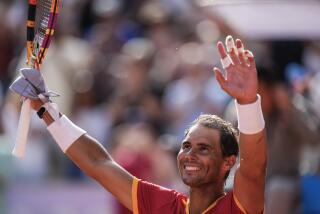TENNIS / JULIE CART : In Davis Cup, Check Swing Means Pay Up
- Share via
Jim Courier said it best: “When people say it’s not about money, it’s always about money.”
Wise words and apt, when describing international troubles with the Davis Cup. Courier and other top players at Indian Wells last week revealed tremendous frustration with the event, and the officials who run it.
It was hailed as a sacrifice when the top two American players consented to play at Palermo, Italy, in two weeks. One of the incentives the U.S. Tennis Assn. used to lure Pete Sampras and Andre Agassi was to fly them to Europe on the Concorde, and to use private jets for connecting flights.
How did it ever come to this, that players expect big paydays to represent their country in tennis’ oldest and most revered international competition? However it happened, it’s here and it’s rampant.
One reason arms have to be twisted is scheduling. The International Tennis Federation, which operates the Davis Cup, squeezes matches into the tour schedule in such a way that players complain about excessive travel and changes in playing surfaces.
For example, Sampras and Agassi will have four days’ travel and practice time after the Lipton tournament at Key Biscayne, Fla. That’s not conducive to top tennis.
Yet, when no one was interested in playing the first U.S. match in Florida against France, a week after the Australian Open, Courier made the long trip without too much complaining. Now that higher-ranked players are taking their turn, and making a great show of sacrifice, Courier is a little ticked off.
“I think we all have to sacrifice at some point and I have been making sacrifices,” he said. “I can’t win the Davis Cup by myself. It takes two to tango in Davis Cup.”
About the change in surfaces--Lipton is on hard courts and the match in Italy will be on clay--Courier said, “Put it this way. I went to India last year from Lipton and played on grass, which is far and away my worst surface, and I got the job done. It can be done.”
Stefan Edberg of defending champion Sweden, who played in each of his country’s matches last year, said Davis Cup is a simple matter of commitment. If Davis Cup is a priority, then devise a schedule that accommodates it. Then be quiet about it.
“I understand their problem with the Davis Cup because I have been going through the same thing,” Edberg said. “I have had to sacrifice for 10 years, because if I would have played only when it suited me, I would play one or two matches a year. I think if you commit yourself right from the beginning, you play every match.”
Americans are paid $25,000 a match by the USTA, as well as a percentage of the prize money. Edberg said he earned $40,000 from Davis Cup last year.
“That’s not why you do it,” he said.
Unless you’re German. The most embarrassing Davis Cup spat at the moment involves Boris Becker and Michael Stich vs. the German Tennis Federation. The federation was determined to get Becker to play this year and met most of his demands. Among other requirements: a one-year contract that pays him $1,848,560 to represent Germany in Davis Cup. He also will get about half a million from German television.
Without knowing the details of Becker’s contract, Stich asked for the same terms. The federation agreed to pay Stich less than $1 million. Stich, who has never refused to play Davis Cup, was happy with his deal until he discovered he had been lied to by federation officials.
“It is not about money,” he said last week. “It is a matter of principle, about people not being honest with me and not telling the truth and trying to, let us say, sell me out a little bit. That is what I don’t like. Now, it is getting (to be) a matter of money because the federation wasn’t honest and maybe possibly lied to me.”
Becker would not discuss Davis Cup.
The matter was resolved on Thursday, when the German Federation announced it had negotiated identical contracts with both players.
Meanwhile, Italian players are said to be trying to cut a deal with their federation. Something about wanting more money.
The bottom line is that the ITF needs to do something about the Davis Cup schedule so players can more conveniently participate. And players have to stop playing games.
If top players don’t want to play Davis Cup, fine, that is each player’s choice. Spend the week off playing in a lucrative exhibition or even, perish the thought, rest. But don’t say you’d like to play but can’t fit it in the schedule.
Tennis players make their own schedules and manage to find time for plenty of tightly scheduled events. Especially if they get paid a ton of money.
More to Read
Go beyond the scoreboard
Get the latest on L.A.'s teams in the daily Sports Report newsletter.
You may occasionally receive promotional content from the Los Angeles Times.











